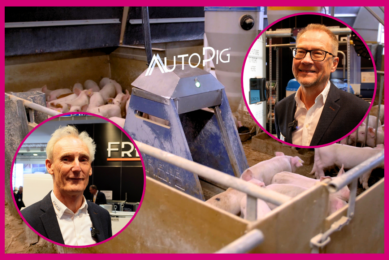BLOG: Antimicrobial use in pigs – where is it going?

The European Commission is setting up a Focus Group under DG AGRI to look at the reduction of antibiotics in the pig sector, so where are we and where should we be going?
This is a more difficult question than most commentators would suppose. Antimicrobials are used in pig production to treat or prevent infections that are out there on the farms. We do not use antibiotic growth promoters in the EU, so they are not part of the equation. However, pig production is always a balance of health and welfare on one side to give good and efficient meat production and disease and poor husbandry on the other side, which reduces production efficiency. Antibiotics, vaccines and other medicines seem to be in the middle. They are useful and necessary tools to reduce the disease side to improve this balance but a lot also depends on the husbandry, management and nutrition side, which may be deficient and encourage disease to develop.
The UK has been a little slow in introducing monitoring programmes for antibiotic use on a species basis, unlike the Danes, Swedes, Dutch etc, although they were one of the first to co-ordinate the collection of overall antimicrobial use in agriculture (VMD, 2012). We also have a new UK Five year Antimicrobial Resistance Strategy 2013-18, produced by our Departments of Human Health and Agriculture, which for the first time importantly state “Increasing scientific evidence suggests that the clinical issues with antimicrobial resistance that we face in human medicine are primarily the result of antibiotic use in people, rather than the use of antibiotics in animals.” This statement is especially important to me, as it has been the basis of the Weblog campaign I have been running over the last 2 years. It does not mean agriculture is off the hook but now we can look at what we are trying to do from a constructive and positive view to improve our own situation, rather than having to act in a defensive and negative way all the time, to counteract the continued misleading barrage of attacks that come from much of the media and politically motivated lobbyists.
The UK’s Strategic Aims also have relevance for us involved in pig production: –
i.Improve the knowledge and understanding of AMR through better information, intelligence, supporting data and developing more effective early warning systems to improve health security. This is where antimicrobial resistance and antimicrobial use monitoring and surveillance will become more important right down to a farm and vet practice level.
ii.Conserve and steward the effectiveness of existing treatments through improving infection prevention and control and development of resources to facilitate optimal use of antibiotics in both humans and animals. From a pig industry perspective this is going to be very relevant, we need to conserve what we have but more importantly we need to improve our infection prevention and control by good biosecurity – do not bring the disease on to the farm and also improve our husbandry and housing/ventilation etc on the farm.
iii. Stimulate the development of new antibiotics, diagnostics and novel therapies by promoting innovation and investment in the development of new drugs and ensuring that new therapeutics reach the market quickly. From a new antibiotic perspective I am not sure industry will develop new families of antibiotics, as the cost/return risks are so high. There are some exciting new products on the horizon though, which will help control resistance development. There is already a flourishing alternative, novel-therapy/feed additive market, but these have had mixed results. However, I think we can expect a steady improvement in new diagnostics based on improved genetic technology.
How we move forward with antimicrobial use monitoring in pigs in the UK and especially the EU will be discussed in a future weblog. So far each country and even ESVAC has its own method of calculation and none are perfect. A reasonable baseline needs to be established, which does not reduce the health and welfare of our pigs and high antibiotic users should be encouraged to reduce their dependency on antimicrobial drugs by better education, improved management and working with their healthcare professionals.











